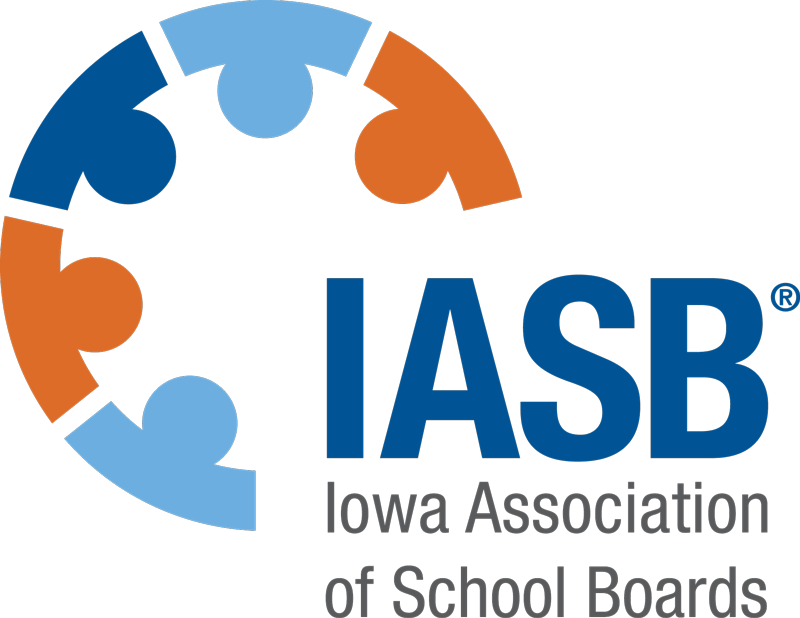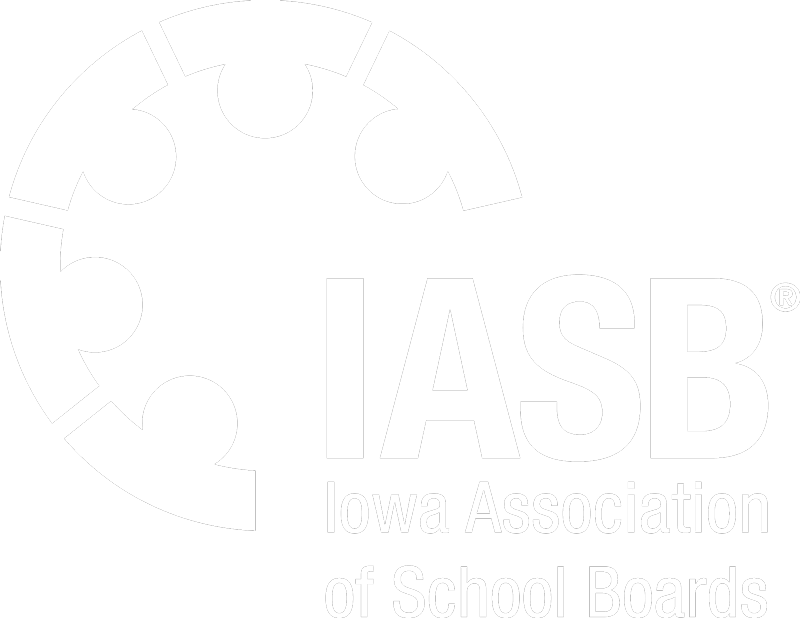Governance
HF 189—Nonpublic School Student Extracurricular Participation: This bill requires public schools to allow resident nonpublic school students to take part in extracurricular activities not provided at the nonpublic school. Additionally, nonpublic school students will be allowed to take part at a contiguous school district if their resident district does not provide the activity. The nonpublic school can’t be in a sharing agreement with another public school district and cannot have offered the activity in the previous two school years for the nonpublic student to participate at the public school.
The bill also says enrollment counts for classification purposes will count the students from the nonpublic school as 25% of the school’s enrollment in grades 9-11. A district's classification, if changed, will not apply to football for two years, and will only change beginning in the 2027-28 school year.
IASB is registered undecided on the bill, but we want districts to be able to make a local decision on sharing and providing extracurricular opportunities to nonpublic school students in their area. The bill passed the Senate by a vote of 31-13 and passed the House by a vote of 59-26. Governor Reynolds signed the bill into law on June 6, 2025.
HF 299—Immunization Exemptions: This bill requires school districts to post information about immunization exemptions on their website and provide the information in registration materials.
IASB is registered undecided on the bill because the requirements are reasonably easy for schools to meet. The bill passed the House by a vote of 58–30 and passed the Senate by a vote of 32-16. Governor Reynolds signed the bill into law on May 27, 2025.
HF 392—Allowing Year-Round School Calendars: This bill would allow school districts to apply to the Department of Education for a waiver allowing a year-round school calendar through 12th grade. Currently, year-round calendars are limited to preschool through 8th grade.
IASB is registered in support of the bill because it allows local control and flexibility when setting the school calendar. The bill passed the House by a vote of 91–1 and passed the Senate by a vote of 47-0. Governor Reynolds signed the bill into law on May 6, 2025.
HF 393—Calculating Dropout Rate: This bill says that a student who drops out of school, returns, and drops out again will only be counted once in a school’s dropout rate, rather than counting them as a dropout both times.
IASB is registered in support of the bill. Districts work hard to get students to return to school and shouldn’t be punished if that student decides to drop out again. The bill passed the House by a vote of 89–2 and passed the Senate by a vote of 47-0. Governor Reynolds signed the bill into law on May 27, 2025.
HF 395—School Bus Driver Training Requirements: This bill intends to make school bus driver training more flexible and provide more local control to school districts. School bus drivers must have:
Commercial driver’s license
Passenger and school bus endorsement
Districts may require additional training, including:
Entry-level driver training
A course approved by the Department of Education
The bill requires the Department of Education to work with the Department of Transportation to establish requirements for providers of entry-level driver training. They will establish content standards, contact hours, and proficiency standards. They will also establish a standard course duration.
IASB is registered in support of the bill. We hope it makes bus driver training more consistent while allowing districts to choose what they require of their bus drivers. The bill passed the Senate by a vote of 50-0 and passed the House by a vote of 64-20. Governor Reynolds signed the bill into law on June 6, 2025.
HF 471—Concussion Protocol Providers: This bill adds that someone who holds a doctorate in psychology with specialty training in neuropsychology or concussion management as a licensed health care provider can administer care when concussion protocol is required.
IASB is registered undecided on the bill, but we welcome any qualified providers to assist districts with concussion protocol. The bill passed the House by a vote of 97-0 and passed the Senate by a vote of 47-0. Governor Reynolds signed the bill into law on May 6, 2025.
HF 706—Open Meetings Fines and Mandatory Training: This bill increases fines for violations of open meetings laws to between $500 and $2,500. If the violation is knowingly committed, the fines increase to between $5,000 and $12,500.
Additionally, it requires training for newly elected public officials, including school board members, on open meetings and open records laws. The training must be 1-2 hours and can be provided by IPIB or another approved provider, like IASB. The bill is written to ensure school board members would be allowed to complete this training at our annual convention, even if they haven’t been officially seated on the board.
IASB is registered undecided on the bill. The increased fines are very steep for unpaid school board members, but we can agree that training on open meetings and open records laws is important, and we already provide this information to our members. The bill passed the Senate by a vote of 34-13 and passed the House by a vote of 83-10. Governor Reynolds signed the bill into law on June 6, 2025.
HF 782—Cell Phone Policies: This bill is the governor’s proposal to require all school districts to implement a policy to restrict cell phone use during instructional time. The bill would require policies to include:
Devices that would be available to use for instructional purposes.
How parents can communicate with students during the school day.
How parents can communicate with students during an emergency.
Protocols the school will follow to securely store a student’s device.
Discipline that will be used if a student uses their device during classroom instruction or an assessment.
A process for a parent to petition for the student to have access to their device during the day if it is for a legitimate reason related to the student’s physical or mental health.
Accommodation for students with an individualized education program (IEP) or 504 plan.
The Department of Education will give guidance on the cell phone policy and how school districts must update their emergency operations plans to incorporate changes because of it. The Department of Education must provide model policies by May 1, 2025.
IASB is registered undecided on the bill. We know many districts have already taken the time to thoughtfully implement cell phone policies that work in their district, and we were hoping new legislation would not require them to make changes to those policies. The bill passed the Senate by a vote of 49-0 and passed the House by a vote of 92-4. Governor Reynolds signed the bill into law on April 30, 2025.
HF 785—Charter School Board Members: This bill allows one charter school board member to be a non-Iowa resident but requires that they are a U.S. citizen.
IASB is registered undecided on the bill. Although we believe all charter school board members should be Iowa residents, just as school board members live in the communities they represent, this change doesn’t fundamentally impact how charter schools are run or change any transparency or accountability standards for charter schools. The bill passed the House by a vote of 60-36 and the Senate by a vote of 32–15. Governor Reynolds signed the bill into law on April 25, 2025.
HF 865—Bullying and Harassment Definition: This bill changes the definition of bullying and harassment by removing the words “based on any actual or perceived trait or characteristic of the student.” Bullying and harassment must be targeted and repeated behavior.
IASB is registered undecided. We’re not sure why the change is needed but think districts will still be able to protect students from bullying and harassment in all forms, even with the new definition. The bill passed the House by a vote of 64-33 and passed the Senate by a vote of 32-16. Governor Reynolds signed the bill into law on May 27, 2025.
SF 171—Reorganization and Dissolution Timeline: This bill extends the timeline for completing a school district dissolution or reorganization to allow the process to be completed without repeating in steps that have already been taken, like required public hearings and votes.
IASB is registered in support of the bill because it helps Orient-Macksburg finish their dissolution process after July 1 of this year. The bill passed the Senate by a vote of 44-0 and the House by a vote of 92-0. Governor Reynolds signed the bill into law on March 12, 2025.
SF 275—Purple Star Initiative: This bill allows the Department of Education to establish a Purple Star School Initiative that recognizes schools that have demonstrated a commitment to serving military-connected students.
IASB is registered in support of the bill because it’s a good initiative to recognize schools’ effort in this area. The bill passed the Senate by a vote of 41-0 and passed the House by a vote of 96-0. Governor Reynolds signed the bill into law on May 2, 2025.
SF 277—Chronic Absenteeism Fixes: This bill aims to correct and fix some of the issues that have come up because of last year’s legislation aimed at addressing chronic absenteeism.
The bill directs the Department of Education to develop model policy to provide county attorneys, which should ensure more consistent enforcement. It removes the requirement that schools send a letter by certified mail to parents or guardians when a child becomes chronically absent, instead requiring it to be sent by email, ordinary mail, or delivered in person. It adds exemptions to the chronic absenteeism policy, including for military service or attending a wedding or funeral. The bill also clarifies that the consequences for being chronically absent, including a school engagement meeting, will only be initiated if the absences are impacting a student’s academic achievement.
IASB is registered in support of the bill. We know there are other fixes that might be required to improve the effectiveness of the new chronic absenteeism law, but this is a step in the right direction. The bill passed the Senate by a vote of 47-0 and passed the House by a vote of 93-0. Governor Reynolds signed the bill into law on May 6, 2025.
SF 278—Robotics Organizations: This bill requires the Department of Education to provide resources to school districts to ensure their robotics clubs and organizations meet federal standards. This will allow those clubs to receive federal money to support their organization.
IASB is registered in support of the bill because it offers federal funding and opportunities for students interested in robotics. The bill passed the Senate by a vote of 46-0 and passed the House by a vote of 95-0. Governor Reynolds signed the bill into law on May 27, 2025.
SF 574—Retention Fees for Public Improvement Contracts: This bill will allow school districts and other public entities to withhold 3%, rather than the current 5%, in retainage fees during a construction project. These fees are designed to ensure that work is completed on a project.
IASB is registered undecided on the bill, but we appreciate that school districts will still have recourse with contractors through a retainage fee. It passed the Senate by a vote of 45-4 and passed the House by a vote of 90-4. Governor Reynolds signed the bill into law on April 25, 2025.
15.3.2025.8

